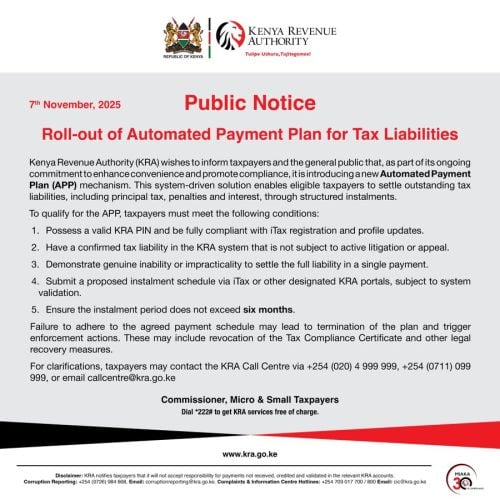Physical Address
60 Ekwema Cres, Layout 460281, Imo
Physical Address
60 Ekwema Cres, Layout 460281, Imo

The Kenya Revenue Authority (KRA) is rolling out a new automated digital system to validate tax returns starting January 1, 2026. This system is designed to check the income and expenses that taxpayers declare in their tax returns, making sure everything matches up correctly with real documents and third-party data. This new automated digital system to validate tax returns is a big step in making tax reporting more accurate and trustworthy.
KRA plans to validate tax returns using this advanced system integrated into its iTax platform. What this means is that when you file your 2025 income tax return in 2026, the system will automatically match your declared income and expenses against electronic tax invoices (TIMS or eTIMS), withholding income tax records, and import data from customs. If there are any mismatches, the system will flag them right away. This will help KRA catch inconsistencies and reduce cases of tax evasion by ensuring that all claims are backed by real, verifiable digital invoices.
Read Next: Enlit Africa & Water Security Africa 2026: Speaker Applications Now Open
One of the key points in this new automated digital system to validate tax returns is that every declared income and expense must have a valid electronic tax invoice linked with the buyer’s Personal Identification Number (PIN), where applicable. There are some exceptions allowed under the Tax Procedures Act and its regulations, but generally, all submitted tax returns need to be supported by these digital records. This means it’s very important for businesses and individuals to keep their electronic tax invoices well organized and correctly submitted to avoid delays or extra scrutiny when filing.

The KRA new automated digital system to validate tax returns is part of a wider government plan focused on modernizing tax administration. By embedding artificial intelligence and machine learning technologies in its processes, KRA aims to boost efficiency, transparency, and voluntary compliance. The result is expected to be a smoother tax collection system, less tax evasion, and more accurate forecasting of revenue, which ultimately benefits the country’s economy.
Ahead of this rollout, KRA is advising taxpayers to review their current annual income and expense records by requesting TIMS or eTIMS schedules from their designated account managers. This way, they can ensure everything is accurate and make any necessary corrections before submitting their returns. KRA has also opened channels for feedback and suggestions from taxpayers and stakeholders to make the process as smooth as possible.
Read Next: Truecaller is Under Fire in South Africa Amid Allegations and a Probe into Privacy Breaches
The move to use this new automated digital system to validate tax returns reflects how technology is reshaping tax administration in Kenya, making it more data-driven and transparent. By connecting tax returns to electronic invoicing and other digital records, KRA hopes to build greater trust and compliance among taxpayers. If you have questions or need help, KRA encourages you to contact their support centers or your local tax office, making this transition easier for everyone involved.
So, from January 1, 2026, the Kenya Revenue Authority will begin using a new automated digital system to validate tax returns. This system will check the numbers you declare against real electronic tax documents and other official data. The aim is to improve tax compliance and make sure everyone pays what they owe fairly and accurately. This new automated digital system to validate tax returns is a major step towards a smarter, more transparent tax system in Kenya. The government is encouraging all taxpayers to prepare and cooperate to make this new process a success.
Was this information useful? Drop a nice comment below. You can also check out other useful contents by following us on X/Twitter @siliconafritech, Instagram @Siliconafricatech, or Facebook @SiliconAfrica.